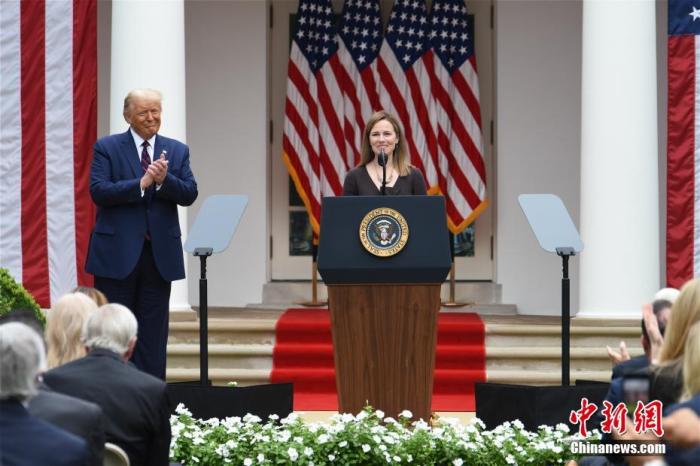News background: Amy Barrett, nominee for the Supreme Court of the United States
China News Service, Washington, September 27 (Reporter Chen Mengtong) US President Trump announced at the White House on the 26th that Amy Barrett (Amy Barrett) was nominated as Supreme Court Justice to replace the late Justice Ginsberg The vacancy left.
On September 26, local time, US President Trump announced at the White House that Amy Coney Barrett (Amy Coney Barrett) was nominated as Supreme Court Justice.
Barrett, 48, is considered a conservative judge.
Photo by China News Agency reporter Chen Mengtong
Who is Amy Barrett?
Why can a 48-year-old white female judge from the southern United States be the new judge?
"Female law professor", "young" and "conservative" can be used as labels for understanding this possible future justice.
Barrett was born in New Orleans, Louisiana in January 1972, the eldest daughter of the family.
His father was a lawyer for an oil company.
The resume released by the White House shows that Barrett graduated from the University of Notre Dame Law School with the first place in the class, and later served as a law professor at his alma mater, focusing on constitutional interpretation.
She was nominated by Trump to serve as a judge of the U.S. Court of Appeals for the Seventh Circuit in 2017.
In just 4 years, Barrett completed his career "triple jump" from a professor of law to a judge of the Federal Court of Appeals to being nominated by a Supreme Court justice.
According to the Associated Press analysis, Barrett and former White House legal counsel McGahn are alumni, and Trump was recommended by the latter as potential candidates for federal judges when Trump took office.
At the time, she had little visibility across the country.
However, Barrett's calm response to sharp issues at the federal judge nomination hearing in 2017 caught Trump's attention.
The New York Times pointed out that if Barrett’s nomination is passed, she will become the 115th justice in the history of the United States and the fifth female justice in the history of the Supreme Court.
Barrett believes in Catholicism and opposes abortion.
She and her husband Jesse Barrett have 5 children, and the youngest child has Down syndrome.
They also adopted two children of African descent from Haiti.
"The President invited me to serve as the ninth justice. As it happens, I am used to being a member of the nine-member group-my family." Barrett said when accepting the nomination and giving a speech at the White House on the 26th.
Regarding the issue of abortion rights, Barrett has said that he does not believe that abortion or abortion rights will change, but some restrictions related to it will change.
"The question is how much freedom the Supreme Court is willing to allow states to restrict abortion."
The Wall Street Post commented that Barrett was an "extremely conservative jurist".
The newspaper believes that Barrett’s past views indicate that she may vote for further restrictions on abortion rights after entering the Supreme Court.
In the late 1990s, Barrett served as an assistant to the late Justice Scalia.
Scalia is known as the "standard bearer" of the American conservative legal movement.
Barrett regarded Scalia as a "mentor".
In a speech at the White House, Barrett recalled his experience working for Scalia more than 20 years ago, "That experience still resonates with me. His (Scarlia) judicial philosophy is also mine: the judge They must act in accordance with the written law. Judges are not policy makers, they must resolutely put aside any policy views that they may hold.” She said.
Barrett also paid tribute to Ginsberg.
She said that although Scalia and Ginsberg had serious differences in the ruling, it did not prevent the two from maintaining a warm and rich personal friendship.
"These two great Americans proved that even if the matter is important, arguments will not destroy the relationship. In my personal and professional life, I have also tried to meet this standard."
The justices have no term limit, and Barrett’s appointment will make the ratio of “conservative” and “liberal” justices of the Supreme Court 6:3.
If appointed, she will become the youngest justice at present, affecting the ideological pattern of the US Supreme Court for decades to come.
"Whether in the short or long term, I don't imagine that the road ahead will be easy." Barrett said, "I assure you that I will meet the challenge with humility and courage." (End)

